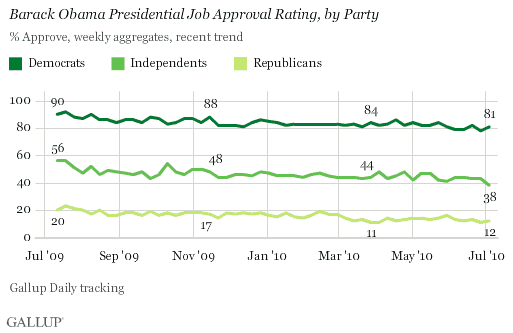PRINCETON, NJ -- Thirty-eight percent of independents approve of the job Barack Obama is doing as president, the first time independent approval of Obama has dropped below 40% in a Gallup Daily tracking weekly aggregate. Meanwhile, Obama maintains the support of 81% of Democrats, and his job approval among Republicans remains low, at 12%.

These data are based on Gallup Daily tracking interviews conducted the week of June 28-July 4.
Over the past year, Obama has lost support among all party groups, though the decline has been steeper among independents than among Republicans or Democrats. Today's 38% approval rating among independents is 18 percentage points lower than the 56% found July 6-12, 2009. During the same period, his support has fallen nine points among Democrats (from 90% to 81%) and eight points among Republicans (from 20% to 12%).
Overall, 46% of Americans approve of the job Obama is doing as president in the June 28-July 4 aggregate, one point above his lowest weekly average. Obama's average weekly job approval rating has not been above 50% since Feb. 8-14, though it reached the 50% mark as recently as May 3-9.
Obama's lower ratings come amid a still-struggling economy, the ongoing difficulties presented by the oil spill in the Gulf of Mexico, and the recent change of command in the war in Afghanistan. Underscoring the challenge at hand, Obama's 44% approval rating in July 2-5 polling (Gallup did not interview July 4) ties his lowest three-day average to date.
Bottom Line
Obama is not alone in facing a challenging second year in office -- Bill Clinton (43%), Ronald Reagan (42%), and Jimmy Carter (40%) all were below the majority approval level in July of their second year. Of course, each of those presidents saw his party lose a substantial number of seats in that year's midterm congressional elections, though both Reagan and Clinton recovered in time to win a second term as president.
Gallup Daily tracking of Election 2010 voting preferences suggests a more favorable Republican than Democratic outcome this year if the elections were held today. Even so, there are still nearly four months remaining before the elections, and thus, time for the Democrats' prospects to improve.
Explore Obama's approval ratings in-depth and compare to past presidents in the Gallup Presidential Job Approval Center.
Survey Methods
Results are based on telephone interviews conducted as part of Gallup Daily tracking June 28-July 3, 2010, with a random sample of 3,055 adults, aged 18 and older, living in all 50 U.S. states and the District of Columbia, selected using random-digit-dial sampling.
For results based on the total sample of national adults, one can say with 95% confidence that the maximum margin of sampling error is ±2 percentage points.
For results based on the total sample of 1,045 independents, one can say with 95% confidence that the maximum margin of sampling error is ±4 percentage points.
Interviews are conducted with respondents on landline telephones and cellular phones, with interviews conducted in Spanish for respondents who are primarily Spanish-speaking. Each daily sample includes a minimum quota of 150 cell phone respondents and 850 landline respondents, with additional minimum quotas among landline respondents for gender within region. Landline respondents are chosen at random within each household on the basis of which member had the most recent birthday.
Samples are weighted by gender, age, race, Hispanic ethnicity, education, region, adults in the household, cell phone-only status, cell phone-mostly status, and phone lines. Demographic weighting targets are based on the March 2009 Current Population Survey figures for the aged 18 and older non-institutionalized population living in U.S. telephone households. All reported margins of sampling error include the computed design effects for weighting and sample design.
In addition to sampling error, question wording and practical difficulties in conducting surveys can introduce error or bias into the findings of public opinion polls.
For more details on Gallup's polling methodology, visit https://www.gallup.com/.
